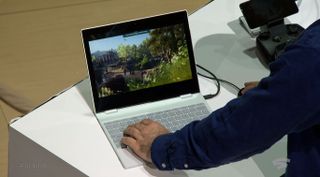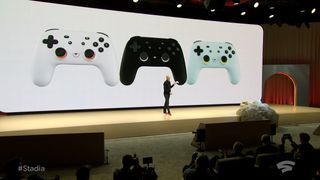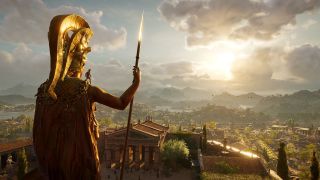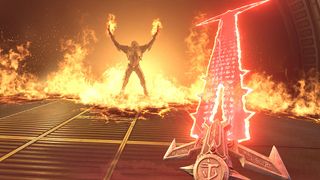Google has revealed Stadia, a cloud streaming service coming later this year that aims to be accessible to everyone. Pricing hasn't been revealed, but the intent behind the service was made clear: Google's infrastructure seemingly puts them in the best position to deliver game streaming at a level we've not seen from past efforts. The keynote also detailed a few partnerships, the reveal of a custom controller, and a 'State Share' feature that lets users relive specific moments of games.
Below, you'll find our reactions to the Stadia announcement, as we discuss what it could mean for PC gaming as a whole. Learn more about Stadia's performance here, and watch the GDC keynote above if you haven't had the chance to check it out yet.
Immediate reactions

Samuel: Google's keynote explored why its version of a game streaming service will be technically better than previous efforts—but it's still just a big promise until I see a game working on a regular-ass internet connection with no lag. If it doesn't work perfectly for everyone, I don't think it could be called a success.
Evan: The paradox of services like Stadia is that they echo some of PC gaming's values, like inclusivity, while violating others, like the meaning of ownership of one's games, mods, settings, and hardware. PC gaming, for many of us, is about eliminating the barriers that exist between hardware and ourselves, and in a way this is what the platform is all about—making it as frictionless as possible for developers to turn a let's-play viewer into someone who's bought and playing the game in-browser five seconds later. But the cost of that will be a relationship with one's hardware and the freedom to modify it, an until-now inseparable part of what it means to be a PC gamer.
Tyler: If Stadia works brilliantly on an average internet connection—I'm skeptical—it could be very cool for those who don't own the hardware needed to play, as their example, Doom Eternal. For us, though, the hobby isn't just about playing games. It's also about building PCs, tinkering with them, modding, and so on. Google says it'll support 4K at 60 fps. We're more interested in 1440p with a 144 Hz monitor. So there's a disconnect there. It doesn't mean Stadia is an invalid idea. We just tend to resist walled gardens, and we value our privacy, and we don't like to be cut off from the things we like just because Comcast is crapping out, so there are a lot of concerns.
Fraser: "For everyone" sounds nice, except I don't think Stadia really will be for everyone. Like Samuel notes, Google promises a lot—"built on an infrastructure no one else has," Majd Bakar said—but I really doubt we're all going to have the same experience. It's not just about getting Doom Eternal running at 60 fps at 4K, but getting it to run at 60 fps at even conventional resolutions consistently without making lots of sacrifices.
Tim: I'm so old, and have been doing this stuff for so long, that it takes quite a bit to surprise me. But that's where I am now. This was an announcement an order of magnitude bigger than I expected, even from an omnicorp like Google. I've paid these streaming boxes almost no heed in the past, largely on the basis that I expected the actual experience to be a lagfest. But this feels different. The inexorable roll out of fiber, coupled with 4K TVs being actually affordable, means I think there's a serious chance this steals much of PlayStation 6 and Xbox One Two's thunder. The ramifications for our space are likely to be more complex, and potentially even more interesting. I get the concerns about the exact experience, but even if this opens up Ultra settings on super low end hardware, then that's potentially going to bring a ton more people into the PC gaming ecosystem. On balance: cautious optimism, but undoubtedly one of the highest potential announcements of the past few years.
The biggest gaming news, reviews and hardware deals
Keep up to date with the most important stories and the best deals, as picked by the PC Gamer team.
James: With so many people in America and across the world that don’t have access to internet capable of streaming games, let alone video, Stadia looks like another luxury for the middle to upper class that solves problems Google invented while ceding control (and a heaping of valuable data) over to a major corporation. Until high speed internet is a guaranteed utility for everyone and until the infrastructure spans the globe, including rural and poor areas without existing access, and unless it proves affordable, Stadia does nothing for me. I’ll be the mad one.
Game ownership

Bo: How you buy and own these games is a big question for me, both how it impacts the user and developers. When/where do you make these purchases, and when you do, who gets paid? I assume Google will take a cut. Or maybe you won't buy games at all, and it'll be a subscription-based service. Either way, they talked a lot about cross-platform, and how you can take your game from one device to the next. But if you buy a game on Stadia, I assume you can't also play that game on your actual gaming PC when you get home. I mean, you can stream to it, but not play it on Steam.
Samuel: No pricing has been revealed for Stadia yet, but either way, I'm not ready to give up game ownership as it currently stands. I like having games installed on my PC. I imagine a lot of existing PC players will feel that way, too. Newer generations of players who have grown up with Netflix and Spotify, though, are likely to have different concepts of digital ownership—and that's where I think what Stadia offers has real potential to succeed, particularly as it's plugged into the YouTube ecosystem. How it sells games is the big question, then.
You can't talk about new Doom Eternal footage or an exciting project from Dylan Cuthbert and then not show them
Tyler: We don't really own our Steam games, either. We only own DRM-free games these days, so on that level it's not different from how things already are. What is different is that it makes every game 'always-online,' and we don't actually get to store and run the game files, which presumably makes modding impossible (except possibly through in-game tools and sharing systems). Those are the bigger concerns for me.
Fraser: Movies and TV shows are fleeting things that I don't mind not really owning, but it's taken me long enough to get comfortable with the idea of giving up physical media—which I'm actually starting to regret—so I'm definitely not ready to subscribe or stream all of my games. Using Steam and the like already limits my access to games I've bought, streaming will likely limit even more. One of the benefits of gaming on PC is being able to easily access the game's files and there's no way I'm interested in giving that up.
Tim: I can't say I came away with a clear sense of exactly how buying and owning games on Stadia happens, and like Samuel I'm still pretty wed to the idea of having some sort of library that's mine in perpetuity, even though each week brings new lessons that that's not true when it comes to digital purchase. Arguably what fascinates me is how much of an existential threat Stadia might pose to Steam if it explodes in popularity. Valve is already facing one upstart contender, I can't imagine it's going to be delighted with a company the size of Google siphoning off more player spend.
State Share

Bo: Maybe this will end up being too gimmicky, but I actually think the State Share function is pretty exciting. You can already pull up a YouTube video of exciting moments—like the final boss fight or something—and watch at your leisure. This is an extension of that, instead letting you jump into that moment and play it our yourself.
Evan: I have zero desire to play a YouTuber's save file of chapter four, mission three of Dishonored 2, or a roguelike, or XCOM 2. The only way this feature is going to appeal to me is if games themselves are designed from the ground up around it, like something that makes "infinite dimensions" a major theme and turns crowdsourced playthroughs into aggregated content, or something.
Samuel: This strikes me as an extension of the PS4's fine innovation, the Share button, which let you take instant screenshots and video for easy sharing. I think a lot of people questioned how exciting that feature was when it was first revealed, and it's undoubtedly been a hit for Sony, as well as a useful marketing tool for anyone selling their games. Imagine the potential of State Share: you could not only read Chris Livingston's diary feature about having a party composed entirely of bears in Pillars of Eternity—you could live it.
Bo: Yeah, I definitely see this being a hit in emergent or choice-driven games. Say you get a super lucky early loadout in something like Spelunky or some other roguelike. You could then share that run with your friends, letting them experience your OP run themselves.
Tyler: It's a speedy way to share save files, which hardly feels as exciting as it was pitched as. I'm open to being wrong, and I look forward to trying a game designed around the functionality—maybe there are creative applications I'm not thinking of.
Fraser: I don't want to share my game or have any kind of YouTube integration. I just want to play in a dark cave with a brick and be left alone. I'm sure it's great if you follow YouTubers and want to jump into their games and experience their save state, but it's probably not for an antediluvian fossil like myself.
Tim: Was this related to letting people jump into your game live on YouTube or am I just old and confused? As someone who does watch and enjoy streams, the idea of jumping into a raid or challenging someone at Hearthstone is… look, I'll probably never do it because I hate most people, but there will be folk who find that exciting. I think? I'm want to go back to bed.
The games Google discussed on-stage

Samuel: I thought this presentation walked a weird line between GDC talk and E3 conference. Was it aimed at both developers and consumers? I assume so—but if I was watching this at home, I wouldn't have been too impressed by the kind of games Google talked about in this presentation.
Assassin's Creed Odyssey, a game I played almost six months ago, was weirdly prominent. Q Games announced it's making something. Doom Eternal is coming to Stadia, but it wasn't even shown off live. Jade Raymond is managing an in-house studio for the platform, but what it's making wasn't revealed. Google has mountains of money, but chose to reveal its platform without a killer app. Nothing shows off a new platform better than new games.
Tyler: I was surprised, too. I thought we'd see a few more high-profile partnerships. As much as we liked 2016's Doom, getting Doom Eternal on Stadia isn't a very big deal. If Red Dead Redemption 2 were there, we'd have something to talk about.
Fraser: What games? It's not like they're launching a console, sure, but the absence of game announcements was kinda bizarre. OK, so we're getting the game we all knew we'd be getting, Odyssey, which players got to stream last year, and Doom Eternal. Google's so excited about telling us about the tech that it seems to have forgotten that the only thing that really matters is what we can play.
Bo: From the presentation, I got the impression that it's devs' responsibility to bring their games to Stadia—basically like porting your game to Xbox or Switch after developing originally for PC. This isn't quite like other—albeit more clunky—streaming services, where you install whatever game you want on remote hardware and then stream it over. Maybe that's not a big deal, but it reiterates that not everything will just magically be on Stadia. Devs will have to put in real, possibly considerable (depending on how difficult the porting process is) development time bringing their games to Stadia. The worrying thing is if devs start developing for Stadia first and skip PC entirely.
Samuel: I think we're a way off of that, but the idea of a streaming platform exclusive does invite that possibility. I can't say it's a reality I'm dreaming of.
Tim: Games are like Chekhov's gun. You can't talk about new Doom Eternal footage or an exciting project from Dylan Cuthbert and then not show them. That was the biggest downer of the announcement for me, and one perhaps underlined by Phil Harrison's ringmaster presence, given that he's presided over some pitches for Grandpa Sony's Gaming Elixir at E3s in the past.
The collective PC Gamer editorial team worked together to write this article. PC Gamer is the global authority on PC games—starting in 1993 with the magazine, and then in 2010 with this website you're currently reading. We have writers across the US, UK and Australia, who you can read about here.
Most Popular




